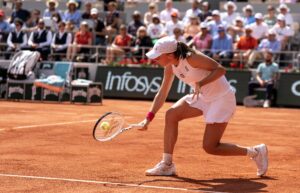Jelena Ostapenko earned her first Top-20 win of the season as she came through in straight sets against British No.1 Johanna Konta in Birmingham.
Ostapenko’s year has been far from good. She won two matches in a row at a single tournament just once this season before today, but this performance overall was easily the strongest in quite some time.
Jelena Ostapenko Defeats Johanna Konta in Birmingham
The Latvian’s game management was extremely good for the most part. She was excellent when it came to understanding the potential dangers of the actual matchup itself. Ostapenko was maintaining the aggressive position on the court, spreading the court nicely to keep her opponent firmly on the back foot and she ended up making the Brit look and feel like a reactionary, cautious player because of the manner of her ball-striking. She did excellent work in changing direction in the point to steal time away effectively, but the biggest of keys in this matchup really was how she prevented Konta from using her better backhand side as an aggressive weapon.
Konta’s commitment was always there as it always is, but she found herself playing point not on her own terms, and that is when the Brit is at her most vulnerable. Konta likes time on the ball, cross-court backhands to dictate and most importantly she wants control in matches, but Ostapenko is one of the better players on tour at hitting the cover off the ball, creating relentless pressure with pace from the baseline and giving her opponent no say in the matter. Even in matches that the Latvian has lost this season it has mostly been because of her own doing, but she was absolutely superb in today’s match and now looks a real threat on the grass this season in particular.
Ostapenko did commit eight double faults, which is always the considerable flaw to her game, but she recovered things well whenever she was put under the microscope and was particularly good at finding the corners of the service box on the big points. Konta at times looked like she was very unsettled, mishitting forehand returns, often rushed and pushed into defensive areas on the backhand corner, but a lot of that was to do with the way her opponent was playing on the day. Ostapenko deprived Konta of the freedom she loves on a tennis court and was a well-deserved victor in the end.
Konta was extremely complimentary of the standard of tennis that Ostapenko was producing on the court and looked mostly at the things her opponent did well in execution rather than the things she could have done more on:
“I mean, I think whenever she plays at her best level, she is very, very hard to play and I think she showed that today. It is quite frustrating to be on the court against her because it felt like any mistake I made had a bigger consequence just because I had so few opportunities in the match and so few little windows to try and build any momentum or string points together. But I knew going into the match that there was going to be every possibility that she was going to be playing like this and I was expecting it because there is no reason why she can’t play freely and when she does, she plays very well.”
“I think when any player is putting a lot of pressure on you in the way they are playing and when they are playing very well, you get very few opportunities in the points, or in the games, to try to dictate, or try to just get a foot up and get into the match and that’s basically it.”
“So when you don’t have many opportunities and you make a mistake, it sometimes feels like it is worth more than it is just because of the few opportunities that are coming by. That’s it.”
Ostapenko was in bright spirits following her second win in succession, and by far her biggest win of the year. She talked through her game-plan for this particular match and what she felt she did well on the day:”It was a good match from my side. I had nothing to lose because Jo is in great form right now and she made the semis at Roland Garros. She is a very good player on grass. So I came into the match without any expectations, but I tried to play my game and be more aggressive. And I think that helped me to win today to be more aggressive, so I didn’t really give her time to play her game.
“I think it is about grass. It’s very hard to move on grass and if you hit the ball hard, it’s harder for the opponent to hit the ball back because it’s coming much faster than on the other surfaces, and the bounce is much lower, so I’m just trying to be even more aggressive and if I have a chance, I just go for the shots.”
The Latvian’s woes now seem to be firmly behind her. There will still be some bumpy roads along the way because simply that is the nature of the brand of tennis she plays, high-risk, full-throttle, but one thing that is for certain is that she feels back at home on the grass courts. A surface she dominated in the juniors game all the way back in 2014.
Main Photo:






